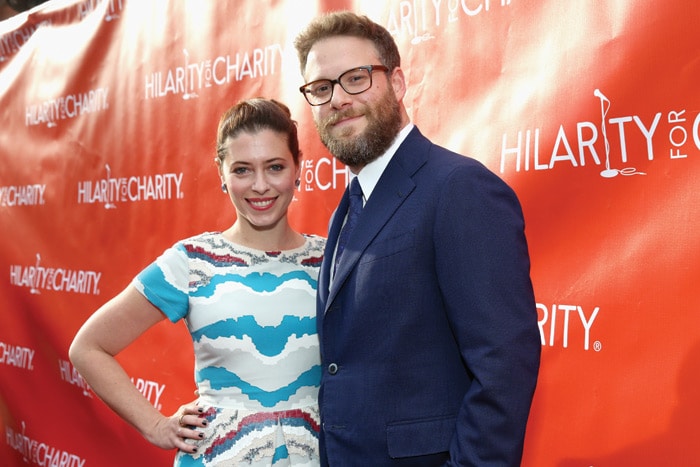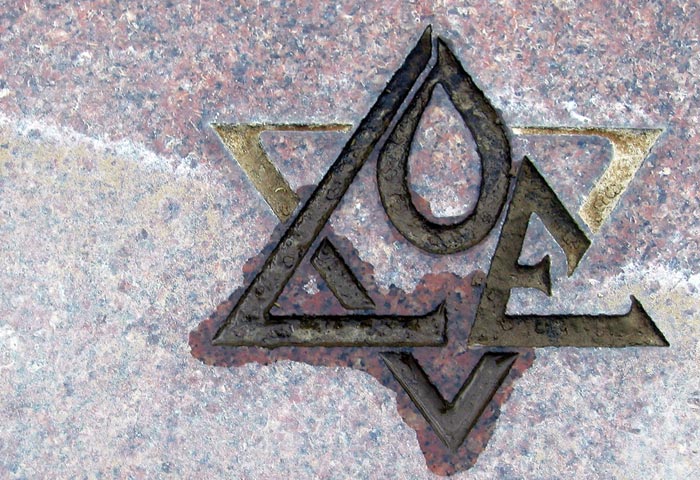 Lauren Miller Rogen and Seth Rogen arrive at Hilarity for Charity’s Third Annual New York City Variety Show at Webster Hall on June 8, 2017 (Photo by Robin Marchant/Getty Images for Hilarity for Charity)
Lauren Miller Rogen and Seth Rogen arrive at Hilarity for Charity’s Third Annual New York City Variety Show at Webster Hall on June 8, 2017 (Photo by Robin Marchant/Getty Images for Hilarity for Charity) “Forget Seth. I’m more interested in you,” I told Lauren Miller Rogen a few weeks ago.
I didn’t really mean those (first) words. Seth Rogen is a famous actor, writer and filmmaker, but his wife, Lauren, is a formidable writer, director and producer. And as soon as I met Lauren, I knew she had a story to tell.
As it turns out, Lauren is a mensch who tells great jokes and loves pretzels and pottery. She and Seth co-founded a wonderful cause called Hilarity for Charity in 2011 to support families affected by Alzheimer’s disease and to educate about brain health.
Hearing Lauren’s poignant story was a reminder that behind every comedic mind, there is a heart once broken by pain.
When she was just 20 years old, her mother, Adele, was diagnosed with Alzheimer’s. “I was not at all equipped emotionally to handle it,” Lauren said. Both her maternal grandparents had suffered from Alzheimer’s and dementia. “Alzheimer’s is slow and cruel,” she observed with an air of graceful, compassionate honesty.
Lauren grew up in Lakeland, Florida. She recalled her family’s amused bewilderment upon seeing a visitor’s pamphlet from the local Chamber of Commerce that listed: “Churches: 300; Jewish churches: One.”
“That about sums up my religious upbringing,” she said. “But having grown up in a small town where I had to hold on to my Jewish identity because there were so few of us, it’s something I feel very connected to personally.”
In January 2004, Lauren moved to Los Angeles and worked as an assistant. The following summer, in 2005, she met Seth. “For the first time,” she said, “I said the words aloud: ‘Something’s not right with my mom.’”
She spoke those words to Seth, whom she describes as “an amazing partner,” and who, in 2014, testified before Congress during a Senate committee hearing about the high cost of caring for Alzheimer’s. Only two senators were present at the hearing, despite the fact that 6 million Americans suffer from the disease (according to the Centers for Disease Control, that number is set to triple by 2060).
“I was really depressed and angry, and it certainly affected my work,” Lauren recalled about her mother’s Alzheimer’s diagnosis at age 55. She quit her assistant job and started to write films. “But writing was hard,” she admitted, “because I was angry and just wanted to look on the internet for a cure for Alzheimer’s.”
“We assume only elderly people have this disease, and that their children and caretakers are older as well.” – Lauren Miller Rogen
That’s when Lauren realized a mistaken narrative about the disease: “We assume only elderly people have this disease, and that their children and caretakers are older as well,” she said. But Adele was in her 50s; Lauren was in her 20s, and she needed to access support for young people affected by Alzheimer’s.
With Seth’s encouragement, Lauren joined a support group for young people with parents suffering from the devastating disease. In 2011, Matthew Bass, a comedy writer and friend of the couple, offered to host an event, which came to be called “Hilarity for Charity,” to raise funds for the Alzheimer’s Association. The event resulted in feedback from young people who reiterated that they didn’t have voice or a space with a disease like Alzheimer’s, which is primarily focused on an older generation.
Hilarity for Charity, which started as a fund within the Alzheimer’s Association, became its own independent non-profit organization in 2017 and changed its name to HFC (its events are still run under the original name). A staff of four oversees two main programs, which include virtual support groups and grant assistance. There’s also a team of devoted volunteers, including Seth, Lauren, Matthew and several other friends.
The virtual support groups are run by a trained therapist and attract attendees from all over the country. The groups met online years before the COVID-19 pandemic, beginning in 2014.
HFC also offers In-Home Alzheimer’s and Dementia Care Grants through a partnership with Home Instead to provide three to six months of free, professional, in-home care for those who take care of loved ones at home, but who can’t afford care for themselves. To date, the program, which helps those in the United States and Canada, has awarded over 350,000 hours of respite-relief for non-professional caregivers (grants are not in the form of cash, but respite hours). “We just want people to have a human moment,” Lauren said.
For the Millers, dealing with Alzheimer’s was truly a family affair.
For the Millers, dealing with Alzheimer’s was truly a family affair; Lauren’s father, Scott, retired early to care for Adele, and her brother, Dan, serves as chair of the HFC board. The organization will celebrate its tenth anniversary this year on November 10, with a virtual game show called “Head to Head.”
Since its inception, HFC has focused on a critical, but often missing puzzle of Alzheimer’s education: brain health. HFC hosts brain health education events such as dinners that include healthy foods and question-and-answer sessions with neurologists. It will soon launch HFC Universe, a website that will teach about brain health and include coursework for students in high school, college and medical school. The educational tool will work in partnership with Dr. Richard Isaacson, founder of the Alzheimer’s Preventative Clinic at Weill Cornell Medicine and New York-Presbyterian.
In February 2020, just one month shy of the pandemic, Adele passed away after a 16-year battle with Alzheimer’s.
“It sounds crazy to say, but in my experience, with a disease like Alzheimer’s, death was the easiest part,” Lauren said. “The hardest part was the 16 years leading up to it: watching her be immobile and unable to speak. It was much more brutal to have been witness to that than to death.” She paused for a moment, and then reflected, “I actually lost my mom many years ago.”
For more information about HFC, visit https://wearehfc.org/























 More news and opinions than at a Shabbat dinner, right in your inbox.
More news and opinions than at a Shabbat dinner, right in your inbox.